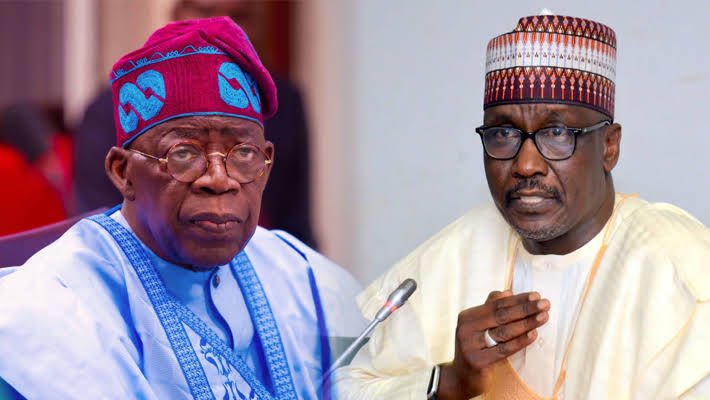
President Tinubu Reshuffles NNPCL Leadership: Mele Kyari Out, Bayo Ojulari Takes Over

In a decisive move aimed at overhauling Nigeria’s oil sector, President Bola Tinubu has dismissed the Chief Executive Officer of the Nigerian National Petroleum Company Limited (NNPCL), Mele Kyari, along with the entire board of the corporation. The President has appointed Engineer Bashir Bayo Ojulari as the new Group CEO, while Ahmadu Musa Kida has been named the non-executive chairman of the reconstituted board.
The announcement was made on Tuesday, April 2, 2025, through a statement by presidential spokesman Bayo Onanuga. The sweeping changes mark a significant shift in the leadership of Nigeria’s state-owned oil giant, as all board members appointed alongside Kyari and former chairman Chief Pius Akinyelure in November 2023 have also been removed.
The newly constituted 11-member board includes key figures such as Adedapo Segun, who had previously replaced Umaru Isa Ajiya as the chief financial officer in 2023. Segun now holds a seat on the board, reinforcing the administration’s commitment to financial oversight in the country’s most critical economic sector.
The restructured board also comprises six non-executive directors representing Nigeria’s geopolitical zones. Bello Rabiu will represent the North West, while Yusuf Usman has been appointed for the North East. Babs Omotowa, a former Managing Director of the Nigerian Liquefied Natural Gas (NLNG), will represent the North Central region.
From the southern regions, President Tinubu appointed Austin Avuru as a non-executive director for the South-South, David Ige for the South West, and Henry Obih for the South East. Additionally, Mrs. Lydia Shehu Jafiya, Permanent Secretary of the Federal Ministry of Finance, will represent the finance ministry, while Aminu Said Ahmed will represent the Ministry of Petroleum Resources on the board.
According to Onanuga, all appointments take effect immediately. He also stated that the restructuring aligns with President Tinubu’s broader agenda to enhance operational efficiency, restore investor confidence, strengthen local content participation, and drive economic growth within Nigeria’s oil and gas sector.
President Tinubu exercised his authority under Section 59, subsection 2 of the Petroleum Industry Act (PIA) 2021 to implement the leadership overhaul. The PIA grants the President power to ensure that the NNPCL is managed with optimal efficiency, reflecting the administration’s commitment to fostering transparency and accountability in the country’s most significant revenue-generating industry.
The President has tasked the new board with a strategic portfolio review of NNPC-operated and Joint Venture assets, ensuring alignment with value maximisation goals. The Tinubu administration, which has championed reforms in the petroleum sector since 2023, has set ambitious targets, including attracting massive foreign investment into Nigeria’s oil and gas industry.
In 2024, NNPCL secured $17 billion in new investments, a milestone that the administration now seeks to double. The government aims to boost this figure to $30 billion by 2027 and $60 billion by 2030, positioning Nigeria as a leading oil and gas investment destination in Africa. The government is also focused on increasing crude oil production to two million barrels per day by 2027 and three million by 2030, alongside plans to ramp up gas production to eight billion cubic feet daily by 2027 and 10 billion cubic feet by 2030.
One of the key expectations from the restructured NNPCL board is an aggressive push towards refining more crude oil domestically. The President has mandated the board to increase the NNPC’s share of crude oil refining output to 200,000 barrels per day by 2027, with a long-term goal of hitting 500,000 barrels per day by 2030. This move is expected to reduce Nigeria’s dependence on imported petroleum products, enhance energy security, and stabilise fuel prices in the country.
Since assuming office, President Tinubu has prioritised economic reforms and oil sector restructuring as part of his broader vision for Nigeria’s economic revival. The latest shake-up at NNPCL underscores his administration’s determination to implement far-reaching changes that will improve efficiency, accountability, and profitability in the oil sector.
The reaction to the restructuring has been mixed. Industry experts and analysts believe that the new board members bring a wealth of experience that could steer the NNPCL in the right direction. However, some stakeholders express concerns over the frequent changes in leadership, warning that instability could affect investor confidence.
Political observers also note that Mele Kyari’s removal comes amid heightened scrutiny of the NNPCL’s operations and controversies surrounding fuel subsidy management. Kyari, who had served as NNPC’s CEO since 2019 and later transitioned to NNPCL’s Group CEO following its incorporation under the PIA, had been a central figure in Nigeria’s oil sector policies, particularly in the deregulation of the petroleum market.
Despite potential uncertainties, the new leadership under Bayo Ojulari faces the enormous task of stabilising Nigeria’s oil sector, increasing output, attracting investments, and restoring confidence in the industry. With expectations high, the coming months will determine whether this latest shake-up will bring the much-needed transformation to Nigeria’s petroleum industry or add to the cycle of leadership changes that have historically hampered the sector’s progress.
For now, the Tinubu administration remains firm in its stance that the restructuring of the NNPCL board is a necessary step toward achieving Nigeria’s long-term energy goals. As the new board settles into office, all eyes will be on its ability to execute Tinubu’s ambitious vision for the nation’s oil and gas industry.


